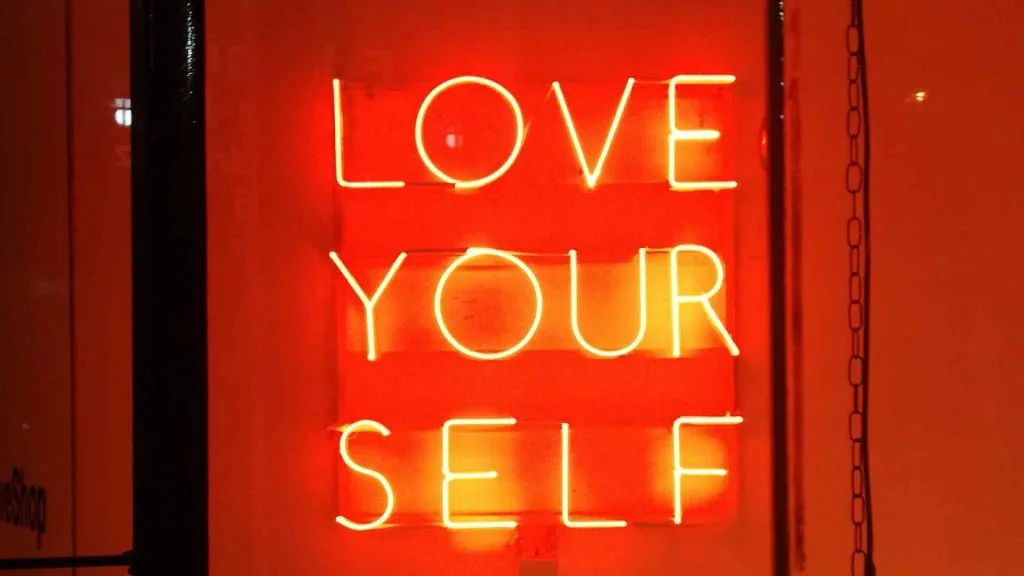Discover the transformative power of self-love with our comprehensive guide.
Explore insightful questions and reflections designed to nurture your journey towards embracing and celebrating your unique worth. Embark on a path of self-discovery and unconditional self-acceptance.

Self-Love Self-Assessment
This self-assessment is designed to help you reflect on your current relationship with self-love.
Answer the following questions honestly to gauge where you stand on your self-love journey and what areas might need more attention.
Below each question are sample responses and insights into what they indicate about your level of self-love.
1. How often do you prioritize your needs and well-being?
- Always: You have a strong foundation of self-love and understand the importance of caring for yourself.
- Sometimes: You recognize the importance of self-love but may struggle to consistently prioritize your well-being.
- Rarely: You may need to work on recognizing and asserting your needs as part of developing self-love.
2. How do you respond to personal failures or setbacks?
- With kindness and understanding: This indicates a healthy level of self-compassion and self-love.
- With indifference: You might be detaching from your experiences, which can hinder self-growth and love.
- With harsh criticism: This suggests an area for growth in cultivating kindness and forgiveness towards yourself.
3. What is your reaction to compliments from others?
- Accept graciously: You value yourself and accept recognition of your worth from others.
- Feel uncomfortable but say thank you: You’re on the path to self-love but may have lingering doubts about your worth.
- Dismiss or doubt their sincerity: This may indicate low self-esteem and an area to improve in accepting love and positivity from others and yourself.
4. How much do you compare yourself to others?
- Rarely: You have a strong sense of self-worth and do not rely heavily on external validation.
- Occasionally: While generally confident, you may sometimes seek validation outside yourself.
- Frequently: This suggests a reliance on external comparison, pointing to an area for growth in self-love.

5. Do you feel deserving of happiness and love?
- Yes, without question: This indicates a high level of self-love and self-worth.
- Sometimes I doubt it: You’re developing self-love but still need to fully embrace your inherent worth.
- No, I often feel unworthy: This response highlights a critical area for growth in recognizing your value and deservingness of love and happiness.
6. How do you deal with stress or emotional pain?
- By caring for myself: You use self-love as a tool for healing and resilience.
- By ignoring or distracting myself: This may indicate avoidance and a need to develop healthier coping mechanisms grounded in self-love.
- By criticizing myself or engaging in negative behaviors: This suggests an opportunity to learn more constructive, self-loving ways to handle difficult emotions.
7. Do you set boundaries in your relationships?
- Yes, clearly and consistently: This shows a strong sense of self-respect and love.
- Sometimes, but it’s difficult: You understand the importance of boundaries but may need to strengthen your practice of setting and maintaining them.
- No, I struggle with boundaries: This indicates a need to work on asserting your needs and protecting your well-being as acts of self-love.
8. How do you feel when you spend time alone?
- Content and rejuvenated: You enjoy your own company, a sign of a healthy self-relationship.
- Bored or anxious: This may indicate discomfort with solitude and an area to explore in developing self-love.
- Lonely and sad: Feeling consistently negative about alone time can suggest a need to cultivate a more loving and fulfilling relationship with yourself.
This self-assessment is not exhaustive but can serve as a starting point for introspection and growth in self-love.
Self-love is a journey, not a destination, and it’s okay to be at different stages in different aspects of your life. Now let’s dive in to those stages!

Understanding Self Love
Exploring the concept of self-love is pivotal in cultivating a fulfilling and compassionate relationship with oneself.
What is self-love?
Self-love is the practice of understanding, accepting, and valuing oneself deeply.
It involves recognizing your worth, catering to your own needs, and granting yourself compassion and kindness, just as you would to others you care about.
How does self-love differ from selfishness?
Self-love and selfishness are distinct in that self-love encourages a healthy respect and care for oneself without the expense of others.
It’s about finding a balance where you honor your well-being while also considering the impact of your actions on those around you.
Why is self-love important?
Self-love lays the groundwork for a positive life outlook, resilience, and the ability to form healthy relationships.
It acts as an internal source of strength, allowing individuals to face life’s challenges with confidence and grace.
Can self-love change over time?
Absolutely, self-love is not static; it’s a dynamic process that evolves with personal growth and experiences.
As individuals learn and grow, their understanding and practices of self-love adapt, reflecting their changing needs and perspectives.

How can I start to love myself?
Initiating the journey of self-love can begin with simple actions like setting aside time for self-care, speaking kindly to yourself, and recognizing your accomplishments.
It’s about making a conscious effort to treat yourself with the same compassion you offer to others.
What are some daily self-love practices?
Incorporating daily self-love practices such as mindfulness meditation, affirmations, journaling, and engaging in hobbies can significantly enhance one’s sense of self-worth.
These activities provide opportunities to connect with oneself on a deeper level, promoting a sense of peace and fulfillment.
How can I be kind to myself?
Being kind to yourself means allowing space for mistakes, understanding that perfection is unattainable, and treating yourself with patience and love.
It involves acknowledging your struggles and offering yourself grace during difficult times.
What role does forgiveness play in self-love?
Forgiveness is a crucial component of self-love, as it involves releasing resentment towards oneself for past mistakes.
Embracing forgiveness facilitates healing, enables personal growth, and strengthens one’s capacity to love themselves fully.
How can I overcome self-criticism?
To overcome self-criticism, it’s essential to challenge and reframe negative thoughts.
Recognizing that self-criticism often stems from unrealistic standards can help in developing a more compassionate and realistic self-dialogue.
How do I deal with feelings of unworthiness?
Addressing feelings of unworthiness begins with acknowledging their presence and understanding their roots.
Engaging in self-reflection, seeking support, and practicing self-affirmation can gradually build a foundation of self-worth and acceptance.

Cultivating Self Love
Cultivating self-love is a journey of personal growth and understanding. It requires patience, practice, and persistence.
How can I start to love myself?
Starting the journey of self-love begins with recognizing your worth and acknowledging that you deserve kindness and respect from yourself.
Simple practices such as speaking to yourself positively, acknowledging your strengths, and forgiving your mistakes can set the foundation for a loving relationship with yourself.
What are some daily self-love practices?
Incorporating self-love into your daily routine can be transformative.
Practices such as mindfulness meditation, writing gratitude lists, engaging in physical activities that you enjoy, and setting aside time for hobbies that nourish your soul can reinforce positive feelings about yourself.
How can I be kind to myself?
Being kind to yourself involves treating yourself with the same compassion and understanding you would offer a close friend.
This means refraining from harsh self-judgment, allowing yourself to make mistakes, and celebrating your successes, no matter how small.
What role does forgiveness play in self-love?
Forgiveness is a vital aspect of self-love, as it allows you to let go of past grievances and self-blame.
Understanding that everyone makes mistakes and that these mistakes are opportunities for growth can help you move forward with compassion and kindness towards yourself.
How can I overcome self-criticism?
Overcoming self-criticism involves changing how you talk to yourself.
Recognize when you’re being overly critical and challenge these thoughts by focusing on your strengths and achievements.
Practicing positive affirmations can also help shift your mindset towards a more compassionate and supportive internal dialogue.

How do I deal with feelings of unworthiness?
Addressing feelings of unworthiness starts with challenging the underlying beliefs that fuel these feelings.
Affirm your value daily, remind yourself of your achievements, and surround yourself with people who uplift you. Recognizing that you are worthy of love and respect, just as you are, is crucial.
What should I do if I don’t feel deserving of love?
Feeling undeserving of love is a common barrier to self-love. To combat this, start by identifying the source of these feelings.
Engage in self-reflection or seek support from a therapist to work through these beliefs. Remember, everyone deserves love and compassion, including you.
How does self-love impact my decision-making?
When you love yourself, you make decisions that reflect your worth and lead to healthier, more fulfilling outcomes.
You’re more likely to choose paths that align with your values and well-being, rather than seeking approval or validation from others.
Can self-love improve my physical health?
Yes, self-love has a positive impact on physical health.
When you value yourself, you’re more inclined to take care of your body, eat nourishing foods, exercise regularly, and seek medical care when needed. This holistic approach to self-care enhances your overall well-being.
How can I remind myself to practice self-love daily?
Setting reminders to engage in self-love practices can be effective.
Use phone alarms, sticky notes, or journal prompts to remind yourself to take breaks, meditate, or engage in activities that bring you joy. Making self-love a priority is essential for lasting well-being.

Challenges to Self Love
Navigating the journey of self-love is not without its challenges.
Facing and overcoming these obstacles is a critical part of the process, leading to stronger self-acceptance and love.
What are common barriers to self-love?
Common barriers include negative self-talk, past trauma, societal pressures, and unrealistic standards of perfection.
Overcoming these barriers starts with awareness and actively challenging and reframing negative beliefs about yourself.
How can I overcome self-criticism?
To overcome self-criticism, it’s essential to practice self-compassion.
Recognize when you’re being overly critical and ask yourself if you’d speak to someone you love in the same way. Replace critical thoughts with affirmations of your strengths and accomplishments.
How do I deal with feelings of unworthiness?
Feelings of unworthiness often stem from comparing ourselves to others or internalizing negative messages from our past.
Address these feelings by focusing on your unique qualities and achievements. Practice self-compassion and remind yourself that worthiness is inherent and not conditional on external factors.
What should I do if I don’t feel deserving of love?
If you feel undeserving of love, it’s important to examine the roots of these feelings. Engage in self-reflection or therapy to uncover and address underlying issues.
Affirm daily that you are deserving of love and kindness, just like everyone else.
How can I stop comparing myself to others?
Comparing yourself to others is a significant hurdle to self-love. Focus on your journey, acknowledging that everyone’s path is unique.
Celebrate your progress and set personal goals independent of others’ achievements.

What role does fear play in self-love?
Fear, especially the fear of failure or not being good enough, can hinder self-love.
Confront these fears by taking small risks and embracing failure as a part of growth. Recognize that courage and vulnerability are strengths, not weaknesses.
How can I silence my inner critic?
Silencing your inner critic requires conscious effort.
When negative thoughts arise, challenge them with evidence of your capabilities and kindness. Over time, this practice can help diminish the power of your inner critic.
What if my environment is unsupportive of my self-love journey?
An unsupportive environment can make cultivating self-love challenging.
Seek out supportive communities, whether online or in person, that uplift and encourage your journey. Remember, your self-worth is not contingent on others’ approval.
Social media can skew perceptions of self-worth through unrealistic comparisons.
Protect your self-love by curating your feeds to include positive, realistic influences and limiting your exposure to negative content.
Can past traumas affect my ability to love myself?
Yes, past traumas can significantly impact self-love, often leading to feelings of unworthiness or self-doubt.
Healing from trauma is a crucial step towards self-love, which may involve therapy, self-care practices, and building a supportive community around you.
Recognizing and addressing the impact of these traumas allows for a path forward, where self-love can flourish.

Self Love and Relationships
The relationship between self-love and interpersonal relationships is profound and complex. Self-love not only affects how we view ourselves but also influences our interactions, boundaries, and the overall health of our relationships with others.
How does self-love impact relationships?
Self-love sets the tone for how we engage in relationships. It teaches us to establish healthy boundaries, communicate our needs effectively, and choose partners who respect and value us.
When we love ourselves, we are more likely to engage in relationships that are nurturing, respectful, and mutually beneficial.
Can self-love improve my relationship with others?
Absolutely. Self-love fosters a sense of inner security and confidence, reducing dependency on others for validation and happiness.
This independence allows for healthier dynamics in relationships, where each party can interact authentically and freely without fear of judgment or abandonment.
How do I maintain my self-love in a relationship?
Maintaining self-love in a relationship requires conscious effort. It involves prioritizing your well-being, practicing self-care, and ensuring that your needs are met.
It’s important to communicate openly with your partner about your needs and boundaries, and to continue engaging in activities that make you feel fulfilled and happy outside of the relationship.
What are the signs that I am sacrificing my self-love for a relationship?
Signs of sacrificing self-love for a relationship include neglecting your needs, interests, and well-being to please your partner, tolerating disrespect or mistreatment, and compromising your values or boundaries.
Recognizing these signs is the first step towards reclaiming your self-love and reassessing your relationship dynamics.
How can I build self-love after a breakup?
Building self-love after a breakup involves taking time to heal, reflect, and focus on personal growth.
Engage in self-care activities, seek support from friends, family, or a therapist, and use the experience as an opportunity to learn more about your needs, boundaries, and desires in relationships.
How does self-love influence my choice of partners?
Self-love influences partner choice by raising standards for how we expect to be treated.
With a strong foundation of self-love, you’re more likely to choose partners who respect, support, and enrich your life, rather than those who diminish your sense of self-worth.
Yes, self-love provides the clarity and confidence needed to address conflicts constructively.
It encourages honest communication, empathy, and the ability to see situations from multiple perspectives, leading to healthier resolutions that respect both parties’ needs.
How can I express love to others without losing sight of my own needs?
Expressing love to others while maintaining self-love is about balance. It involves openly showing care and affection for others, while also asserting your needs and boundaries.
Regular self-reflection and communication with your loved ones can help maintain this balance.
What role does self-love play in ending toxic relationships?
Self-love is crucial in recognizing and exiting toxic relationships.
It empowers you to recognize your worth, acknowledge the detrimental impact of the relationship on your well-being, and take decisive action to protect your health and happiness.
How can I encourage my partner to practice self-love?
Encouraging your partner to practice self-love can be done by modeling healthy self-love behaviors, supporting their interests and growth, and expressing appreciation for their unique qualities.
Engage in open discussions about the importance of self-love and how it benefits both individual well-being and the relationship.

Advanced Concepts in Self Love
Delving into the advanced concepts of self-love involves exploring deeper layers of personal growth, self-awareness, and the transformative power of truly embracing oneself.
These concepts challenge us to expand our understanding of self-love beyond basic self-care to include how we engage with our inner selves and the external world.
How can self-love lead to personal growth?
Self-love is a catalyst for personal growth. It encourages introspection, allowing us to confront and heal from our past, understand our present, and aspire for a future that aligns with our true selves.
This process fosters resilience, adaptability, and a deeper understanding of our desires and boundaries, leading to holistic growth.
What is the role of self-love in setting boundaries?
Setting boundaries is an act of self-love. It involves recognizing and asserting our needs, limits, and values to protect our well-being and respect our integrity.
Through self-love, we learn to communicate our boundaries clearly and confidently, ensuring that we engage in healthy and respectful relationships.
How does self-love influence my life choices and career?
When we operate from a place of self-love, our life choices and career paths are more likely to reflect our true passions, strengths, and values.
Self-love empowers us to pursue opportunities that fulfill us and to walk away from situations that do not serve our highest good, leading to a more authentic and satisfying life.
How can I cultivate self-love in times of change and uncertainty?
Cultivating self-love during times of change and uncertainty involves embracing flexibility, practicing self-compassion, and staying grounded in your values.
Acknowledging your resilience, leaning on supportive practices and communities, and reminding yourself of your ability to adapt can reinforce self-love during challenging times.
What is the connection between self-love and spirituality?
Self-love and spirituality often intersect in the quest for inner peace and understanding.
Many spiritual practices emphasize the importance of self-compassion, forgiveness, and the acknowledgment of one’s inherent worth, which are foundational to self-love.
This connection can lead to a deeper sense of purpose and connectedness with the universe.
How does self-love affect my interactions with the environment and society?
Self-love fosters a sense of responsibility and connection to the world around us.
When we value ourselves, we are more likely to engage in behaviors that reflect respect for our environment and society, such as sustainable living practices and acts of kindness and advocacy.
Can self-love lead to financial well-being?
Yes, self-love can positively impact financial well-being by promoting a mindset of abundance and self-worth.
It encourages making financial decisions that align with personal values and long-term goals, advocating for fair compensation, and managing finances in a way that supports overall well-being.
In the digital age, self-love involves mindful engagement with social media, recognizing its impact on self-esteem and mental health.
It means setting boundaries around usage, seeking authentic connections, and consuming content that uplifts and inspires, rather than diminishes, self-worth.
What is the role of creativity in self-love?
Creativity is a powerful expression of self-love. It allows for the exploration and manifestation of one’s inner world, offering a sense of fulfillment and self-acknowledgment.
Engaging in creative activities can be a therapeutic practice that nurtures self-esteem and joy.
How can self-love improve resilience in the face of adversity?
Self-love builds resilience by fostering a strong sense of self-worth and trust in one’s abilities to overcome challenges.
It involves practicing self-compassion, celebrating small victories, and viewing setbacks as opportunities for growth, which are essential for navigating and thriving through adversity.



Leave a comment
You must be logged in to post a comment.